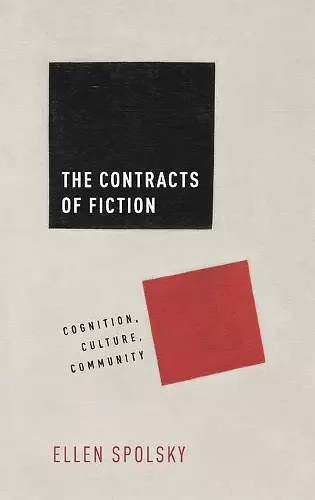The Contracts of Fiction
Cognition, Culture, Community
Format:Hardback
Publisher:Oxford University Press Inc
Published:21st May '15
Currently unavailable, and unfortunately no date known when it will be back

This insightful work examines how narratives function as social contracts, connecting fiction to everyday life and revealing their role in shaping societal values.
In The Contracts of Fiction, readers are invited to explore the concept of fictional narratives as governed by social contracts. This perspective encourages us to view both animate and inanimate aspects of daily life as abstractions that are shaped by these agreements. By reconnecting our fictional experiences to the realities of our lives, the book challenges the tendency to regard imaginative works as mere entertainment devoid of deeper meaning. Instead, it posits that various forms of fiction play a crucial role in constructing, guiding, and questioning the institutional relationships within social groups.
The text delves into how these contracts, akin to those found in language, law, kinship, and money, establish the rules that facilitate interaction within a community. Members of a group navigate between tangible elements of their environment and the abstract values that confer significance upon them. Through a reexamination of literary concepts such as genre and style, informed by insights from biological, cognitive, and brain sciences, The Contracts of Fiction illustrates the ways in which fictions engage both our bodies and minds, fostering a delicate balance between continuity and adaptability in society.
Ellen Spolsky’s work reveals the intricate connections between life and art, emphasizing how both realms are influenced by disorder and uncertainty. For instance, in early modern London, societal changes prompted a surge in revenge tragedies like Hamlet, which, through their very form, highlighted the urgent need for reform in the justice system. By examining these dynamics, the book underscores the vital role of narratives in generating knowledge about our surroundings and the complexities of human experience.
Why do all people everywhere of all ages in all societies over all history and throughout the entire world invest nearly inconceivable resources in imaginative fiction-dreams, daydreams, simulations, counterfactual scenarios, possibilities, reveries, poems, plays, films, cartoons, tragedies, comedies, dramas? The scientific question is open, grand, and fundamental. Ellen Spolsky's cognitive defense of fiction is a major contribution. * Mark Turner, Institute Professor and Professor of Cognitive Science, Case Western Reserve University *
Instability, failure, and representational hunger afford individuals and societies 'the freedom to reimagine and change direction,' while art and literature are the protected spaces for such reimagining. To explain how this works, Spolsky brings together cutting-edge research in evolutionary biology, social and legal history, and literary criticism. Brilliant, witty, reader-friendly, The Contracts of Fiction is the gold standard of cognitive literary studies. This is the scholarship of the future. * Lisa Zunshine, editor of The Oxford Handbook of Cognitive Literary Studies *
Extending the author's pioneering efforts to foster dialogue between literary studies and the cognitive sciences, Ellen Spolsky's The Contracts of Fiction shows how a range of artifacts * poetry as well as drama, narratives as well as static imagescan both illuminate and be illuminated by research concerned with culture, communities, and cognition, including evolutionary psychology, categorization theory, memory research, accounts of embodied and socially distributed cognition, and work on the biology of conscious life more generally.David Herman, author of Storytelling and the Sciences of the Mind *
The Contracts of Fiction asks why we invest so much energy producing, consuming, and sharing fictions despite their evident lack of truth value. Deftly recruiting concepts from the biological and cognitive sciences to the aid of literary theory, Ellen Spolsky produces the most compelling synthesis to date of cognitive, evolutionary, and literary understandings of the human imagination. * Alan Richardson, author of The Neural Sublime *
ISBN: 9780190232146
Dimensions: 152mm x 236mm x 28mm
Weight: 599g
320 pages